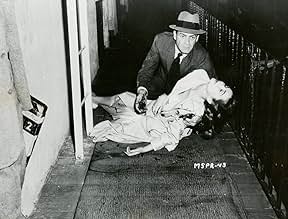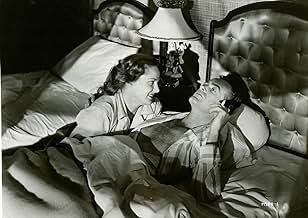In Arizona, a train's baggage car is robbed of a large payroll, prompting an investigation led by a railroad official-insurance investigator team.In Arizona, a train's baggage car is robbed of a large payroll, prompting an investigation led by a railroad official-insurance investigator team.In Arizona, a train's baggage car is robbed of a large payroll, prompting an investigation led by a railroad official-insurance investigator team.
Rodolfo Hoyos Jr.
- Lt. Castro
- (as Rudolpho Hoyos)
Robert Anderson
- Sheriff Jack of Winston
- (uncredited)
Raymond Bailey
- Sam Hendricks
- (uncredited)
Art Balinger
- Jail Officer
- (uncredited)
Howard Culver
- Pete the detective
- (uncredited)
Roy Glenn
- Train Porter
- (uncredited)
William Kendis
- Eddie, baggage handler
- (uncredited)
John Maxwell
- Train Conductor
- (uncredited)
Anna Navarro
- Mexican Bar Fly
- (uncredited)
- Director
- Writers
- All cast & crew
- Production, box office & more at IMDbPro
Featured reviews
You would think that by 1956 nobody could breathe new life into a train robbery tale. But in this film there are two major surprising twists, one near the beginning and then one smack in the middle.
Because half a million was taken in the robbery, a crack insurance investigator has his vacation to Mexico postponed to solve this crime. He is paired up with a bulldog of a railroad detective. Very shortly the pair determine that this crime was meticulously planned. But because it is obvious the crooks were working by a "time table" (thus the title), the railroad investigator says that is their weak link. Find a place where they couldn't make their time table, and the case should be something that can be cracked.
This is somewhat like a film noir and somewhat like a crime drama - a bit half and half. The interesting theme here is that of a normal middle class person turning to crime not because of one small bad decision snowballing or some life event causing a desperate need for money beyond their means, but because of living a life of "quiet desperation". Maybe this film is not remembered so much because that theme has become quite common in the decades that have passed. But in the "I Like Ike" 1950s, the idea of somebody not being happy with a chicken in their pot and their suburban tract home was almost blasphemy.
I'd highly recommend it. I haven't given too many details because to say much at all would spoil it for you.
A funny coincidence - Actor Raymond Bailey as the insurance company executive, calmly stating that if the crime cannot be solved and the loot recovered, then the company may have to pay out half a million. Bailey played skinflint banker Milburn Drysdale during the 1960s in the Beverly Hillbillies, and THAT character would have had a heart attack over losing such a sum!
Because half a million was taken in the robbery, a crack insurance investigator has his vacation to Mexico postponed to solve this crime. He is paired up with a bulldog of a railroad detective. Very shortly the pair determine that this crime was meticulously planned. But because it is obvious the crooks were working by a "time table" (thus the title), the railroad investigator says that is their weak link. Find a place where they couldn't make their time table, and the case should be something that can be cracked.
This is somewhat like a film noir and somewhat like a crime drama - a bit half and half. The interesting theme here is that of a normal middle class person turning to crime not because of one small bad decision snowballing or some life event causing a desperate need for money beyond their means, but because of living a life of "quiet desperation". Maybe this film is not remembered so much because that theme has become quite common in the decades that have passed. But in the "I Like Ike" 1950s, the idea of somebody not being happy with a chicken in their pot and their suburban tract home was almost blasphemy.
I'd highly recommend it. I haven't given too many details because to say much at all would spoil it for you.
A funny coincidence - Actor Raymond Bailey as the insurance company executive, calmly stating that if the crime cannot be solved and the loot recovered, then the company may have to pay out half a million. Bailey played skinflint banker Milburn Drysdale during the 1960s in the Beverly Hillbillies, and THAT character would have had a heart attack over losing such a sum!
The film gets off to a really good start. A slick crime with no clues appearing and you're wondering how the investigators are going to solve it. I'm thinking this is great (8 or 9 out of 10); a real puzzle but out of the blue they catch a member of the gang with no explanation as to how they found him. Then other members of the gang start making mistakes by not following orders. If the crime had been solved by deduction it could have been a great movie. Gripping start but soon disappoints.
It's remarkable how many actors from the Golden Age of Hollywood began or ended their careers making crime pictures ( or horror movies). Mark Stevens is a case in point. He began promisingly enough with the stylish noir The Dark Corner in 1946 and basically ended it with Timetable ten years later. Was he a classic Marlowesque private eye in the first one, in Timetable the rigors of maintaining a Hollywood career have visibly and morally taken their toll. Directed by Stevens himself, all the glamour of the classic noir is drained from both the look of the film as from the protagonists. Stevens has the look of a man who has seen too much and has basically given up hope that his life will change for the better. Even his last desperate attempt to turn his life around seems doomed from the start. Which is not helped by the strict moral code of the day that is constantly underlined, namely that Crime Doesn't Pay. The plot is a little convoluted, but then that's not what we watch these movies for. Stylistically it has little going for it,and small effort was made to avoid a stage-bound look. But the performances are adequate enough and especially Stevens is totally convincing as the world-weary protagonist. For noir fans this one is certainly worth a look.
I seen many bad reviews for this film and I just do not get it. I love it, it may not be the greatest film ever made but I love it. It is cheesy and I am okay with that. If you watch it without being overly critical it is a fun watch. It has its twists and turns which keep you interested. The plot is pretty decent and for the time original. If you like this genre of film you should really enjoy this one. Mark Stevens does a credible job as the lead and it is the earliest film I believe I saw Jack Klugman in. Ignore the nay sayers and give it go it may not be the best film you have seen but it will keep you entertained and in the end that is all a film is supposed to do. Yes there are some issues with the film but it was not a big budget movie and they do a brilliant job with what they are given. Try it, you won't regret it.
Gang executes intricate train robbery, putting two insurance investigators on their trail, with a major twist.
At about the time Kubrick was making a reputation with his heist film The Killing (1956), Mark Stevens put together this little gem. Unlike Kubrick's classic, this caper film doesn't rise to semi-artistic heights, but it is tight, tough, and well-acted, with some nice touches. For example, there're the surly baggage handler and the brusque airplane mechanic, both colorful bits that could have easily remained routine.
Aben Kandel's script is carefully plotted, dribbling out pieces of information that keep us glued to developments-- plus that great opening hook with its careful staging. But what I especially like is his and Stevens' attention to jilted wife Ruth (Stewart). It would have been so easy to shove this plain-faced woman aside as Stevens cavorts with the lovely Linda (Farr). Instead they play up her heartbreak as this drably devoted wife watches the collapse of everything she holds dear. In my book, it's a sensitive dimension that helps lift this 80- minutes beyond the simply well-crafted.
In addition to Stewart's fine performance is King Calder's (Armstong). His humorless, Bassett hound face is perfect for the dogged investigator who knows the importance of visualizing and goes where the evidence takes him, regardless. Look too for Jack Klugman (Frankie) in one of his earliest film roles.
Judging from Stevens' list of credits (IMDB), he's one of those contract players trying his best after the break up of the old studio system and the decline of the B-movie. Whatever his later misfortunes (Gunsight Ridge {1957}; Gun Fever {1958})-- he and Kandel team up to score solidly with this overlooked little caper gem.
At about the time Kubrick was making a reputation with his heist film The Killing (1956), Mark Stevens put together this little gem. Unlike Kubrick's classic, this caper film doesn't rise to semi-artistic heights, but it is tight, tough, and well-acted, with some nice touches. For example, there're the surly baggage handler and the brusque airplane mechanic, both colorful bits that could have easily remained routine.
Aben Kandel's script is carefully plotted, dribbling out pieces of information that keep us glued to developments-- plus that great opening hook with its careful staging. But what I especially like is his and Stevens' attention to jilted wife Ruth (Stewart). It would have been so easy to shove this plain-faced woman aside as Stevens cavorts with the lovely Linda (Farr). Instead they play up her heartbreak as this drably devoted wife watches the collapse of everything she holds dear. In my book, it's a sensitive dimension that helps lift this 80- minutes beyond the simply well-crafted.
In addition to Stewart's fine performance is King Calder's (Armstong). His humorless, Bassett hound face is perfect for the dogged investigator who knows the importance of visualizing and goes where the evidence takes him, regardless. Look too for Jack Klugman (Frankie) in one of his earliest film roles.
Judging from Stevens' list of credits (IMDB), he's one of those contract players trying his best after the break up of the old studio system and the decline of the B-movie. Whatever his later misfortunes (Gunsight Ridge {1957}; Gun Fever {1958})-- he and Kandel team up to score solidly with this overlooked little caper gem.
Did you know
- TriviaThe $500,000 payroll stolen would be the equivalent of $4,400,000 in 2016.
- GoofsIn the robbery, Dr. Paul Brucker removes three small cash bags from the safe and puts them in his suitcase. But the heist was $500,000 in small bills. Even all new $20 bills wrapped and stacked together would make a pile more than nine feet high. With mixed used small bills ($5 to $20) that couldn't be traced, it would take a large suitcase to handle the money. And, it would weigh at least 60 pounds.
- Quotes
Joe Armstrong: There's no such thing as a perfect crime. Just a lucky one. But their luck will run out.
- ConnectionsFeatured in The World Famous Kid Detective (2014)
- How long is Time Table?Powered by Alexa
Details
- Release date
- Country of origin
- Official site
- Language
- Also known as
- Timetable
- Filming locations
- Production company
- See more company credits at IMDbPro
- Runtime
- 1h 20m(80 min)
- Color
- Aspect ratio
- 1.37 : 1
Contribute to this page
Suggest an edit or add missing content





























